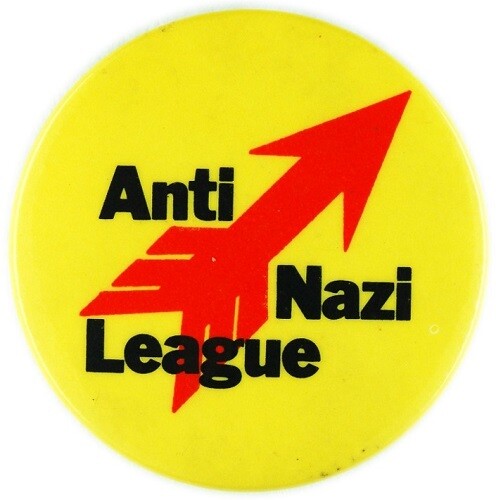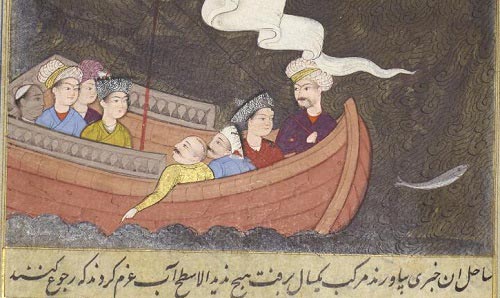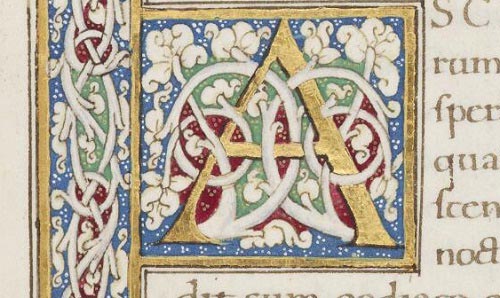
Ahmed Iqbal Ullah RACE Centre Collections
The Ahmed Iqbal Ullah RACE Centre is an archive and open-access library specialising in the study of race, ethnicity, migration, social justice and anti-racist activism, located in Manchester Central Library.

The Centre was established by Lou Kushnick, Professor of Sociology at The University of Manchester, in 1999. His vision was to develop a collection that would not only have major research value, but also be instrumental in celebrating cultures and combating racism. It is named after Ahmed Iqbal Ullah, a Bangladeshi schoolboy who, at the age of 13, was stabbed to death in a racist attack by a fellow pupil in the playground of a high school in Manchester.
The Ahmed Iqbal Ullah RACE Centre’s unique and growing archive, library and oral history collections are of international significance. They document the history of race, anti-racist activism, social justice campaigning and multiculturalism in Manchester, the UK and the United States, with a chronological focus from the 1960s to the present day. The Centre works with its sister organisation, the Ahmed Iqbal Ullah Education Trust, which leads in pioneering community-led collecting and ethical collaboration with global majority communities in Greater Manchester and further afield, to give voice to their rich histories and heritage, and to make them visible.
The collections are relevant to anyone interested in the fields of race, ethnicity, multiculturalism, migration, colonial and postcolonial history, social history, radical history, American studies, literature, linguistics, sociology, criminology, political studies, gender studies, media studies, art history and visual studies.
The catalogues for the collections can be searched through the Manchester Libraries catalogue, and as part of the University of Manchester Library’s Special Collections can also be searched through Library Search.
Archives
Thanks to the community-led collecting delivered by the Education Trust, the RACE Centre is home to a rapidly growing collection of archives that document issues of race, ethnicity and migration, and the lived experience of Global Majority communities in Greater Manchester and further afield. The Centre holds national collections relating to race relations in the UK, such as the Commission for Racial Equality and the Institute of Race Relations; the archives of community organisations in Greater Manchester, including those of Ananna: Manchester Bangladeshi Women's Organisation, and the Manchester Refugee Support Network; as well as the papers of pioneering individuals who have made a difference in fighting racism and promoting diversity and inclusion, among them Ann Adeyemi, Malik Bakht and Eloise Edwards. The archives contain a wide range of material including oral history interviews, correspondence, photographs and ephemera.
Notable collections include:
- Ann Adeyemi Collection, 1928-1990s. The biographical archive of a woman of mixed race parentage (with a white Irish grandmother and black Liberian grandfather) growing up in Manchester in the 1950s.
- Ananna: Manchester Bangladeshi Women's Organisation Collection, 1988-2014. Material concerning the governance, administration and promotional activities of Ananna, a unique organisation providing services for Bangladeshi women by Bangladeshi women and for the benefit of the whole community.
- Malik Bakht Collection, 1950-2018. The biographical collection of Abdul Malik Choudhury Bakht (born in Assam in 1924), Yvonne Bakht (née Parker), and the South Asian community in Manchester, 1950-1970.
- British Fascism and Anti-Fascism Collection, 1948-2016. A collection of archive material relating to far right and fascist political parties, including propaganda both produced by, and in support of, the British Movement and the National Front. The collection also contains anti-fascist materials and publications, which often directly engage with the fascist material of the same time.
- Cheetham Hill Advice Centre Archive, 1978-2019. Contains a variety of material illustrating the Centre’s work helping to relieve poverty, distress and sickness in the Cheetham Hill area of Manchester, in particular supporting vulnerable people, the elderly, those living with disabilities and asylum seekers.
- Collection of Steve Cohen, lawyer and anti-deportation campaigner, 1975-1996. A collection of archives and ephemera from over 70 anti-deportation and immigration campaigns fought in Greater Manchester, formed by the immigration lawyer Steve Cohen.
- Papers of the Commission for Racial Equality, 1966-2003. Reports, memoranda, newsletters and ‘grey’ literature produced by the CRE and its predecessor bodies, the Race Relations Board and the Community Relations Commission, as well as many other organisations.
- Marilyn Cuffy Collection, 1976-2003. Papers collected by Marilyn Cuffy in her role as a community and youth worker in Manchester, including the papers of the Manchester Black Resource Centre and Community Trust predominantly covering the decades of the 1980s and 1990s.
- Papers of Beresford Edwards v. Society of Graphical and Allied Trades, 1965-1970. Papers relating to the successful case brought by Guyana-born Beresford Edwards against the Society of Graphical and Allied Trades (SOGAT) trade union.
- Elouise Edwards Collection, 1969-1999. Papers relating to the many projects that Elouise Edwards was involved with during the 1970s, ’80s and ’90s, including her work at the Family Advice Centre in Moss Side and her role as a prominent anti-racism community activist in Manchester.
- Papers of the Hulme Study, 1985–1996. Reports, surveys, correspondence, newspaper articles and minutes relating to a study undertaken from 1987 to 1990 to formulate proposals to improve the environmental, commercial, employment and social conditions in Hulme and Moss Side.
- Institute of Race Relations Collection, 1958-1990. Administrative papers, correspondence, reports, press releases and newspaper articles relating to the Institute of Race Relations, founded in 1958; the centre also holds the IRR’s extensive collection of newspaper cuttings.
- Papers of Farhat Khan, 2000-2019. Papers relating to the successful Farhat Khan and Family Must Stay anti-deportation campaign against the deportation of Farhat Khan and her family, including promotional material, photographs, newspaper cuttings and copies of speeches.
- Lou Kushnick Collection, 1965-2008. An extensive collection documenting Lou Kushnick’s work and research relating to race relations in the UK and US, including 95 interviews with key figures who discuss American politics, economics, health and welfare and racial polarisation in the 1980s and 1990s.
- Legacy of Ahmed Project Archive, 1984-2016. A collection created through the project conducted by the Ahmed Iqbal Ullah Education Trust in 2016, exploring the memories of Ahmed’s murder and the organisations that were established in his memory of him including the Ahmed Iqbal Ullah Memorial Trust and School, and the Manchester Bangladeshi Women's Organisation, Ananna.
- Macdonald Inquiry Archive, 1981-1988. Papers relating to the Macdonald Inquiry into Racism and Racial Violence in Manchester, set up by Manchester City Council in 1987 following the death of Ahmed Iqbal Ullah, aged 13, who was killed by a fellow pupil in the playground of Burnage High School in 1986.
- Manchester Refugee Support Network (MRSN) Collection, 1968-2015. The organisational archive of the MRSN, documenting its governance, structure and development, its activities including the Refugee and Migrant Forum Manchester, its services, partnerships and activities.
- Memories of Partition Project Archive: 2017-2018. Oral histories, video interviews and interpretative materials from an 18-month project run by Manchester Museum, which aimed to capture, record and interpret some of the many hidden, personal experiences relating to the 1947 Partition of India.
- Pan-African Congress 1945 and Related Celebratory Events 1982-1995. Material relating to the Pan-African Congress held in Manchester in 1945, and the celebratory/commemoration conferences held in Manchester in 1995, including leaflets, invites, photographs, press releases, letters and programme of events etc. collection and oral history interviews.
- Tandana Archive: papers of the Bradford and Sheffield Asian Youth Movements, 1977-1990. Papers created and collected by the Asian Youth Movements established in Bradford and Sheffield in the late 1970s and early 1980s, including governance and administrative papers and material relating to campaigns against racism, police harassment, workers’ rights and solidarity campaigns.
- Voices of Kosovo in Manchester Collection, 2014-2019. Audio recordings of interviews, with summaries and transcriptions, pen sketches, and photos of some interviewees, compiled during Manchester Aid to Kosovo’s project to record and preserve the story of the Kosovar community in Manchester.
Oral histories
Life stories – the voices of real people – are an extremely rich and expanding element of the RACE Centre’s collections. There are more than 300 individual recordings, mostly with members of local Global Majority communities talking about life in Manchester. These oral histories preserve the voices of those who have traditionally been hidden from (written) history. Notably, many of the interviews were delivered by people from global majority communities, in their own heritage projects supported by the Education Trust. As a result, the interviews are framed by community members (rather than an outsider) and often are recorded in the languages interviewees feel most comfortable in. Collections cover the experiences of people of Afghan, Bangladeshi, Caribbean, Chinese, Congolese, Indian, Kosovan, Kurdish, Pakistani, Sikh, Somali, West African and Yemeni heritage.
Key collections include:
- Roots Oral History Project. Life story interviews carried out with members of the Manchester African and Caribbean communities in the 1980s and 1990s. 26 interviews donated by Maria Noble and Elouise Edwards.
- Exploring Our Roots. 74 life story interviews carried out by young people, as part of our own project. This collection includes transcripts and audio and video recordings with people of Sikh, Bangladeshi, Pakistani, Indian, Chinese, West African and Caribbean heritage, all living in Manchester.
- Memories of Partition Project. At the heart of Memories of Partition was a community-based oral history programme, designed to capture, record and interpret some of the many hidden, personal experiences relating to Partition, with the aim that balanced representation was afforded to Muslim, Hindu and Sikh communities at all times.
- Yemeni Roots, Salford Lives. 20 audio interviews, with written summaries, recorded with members of the Salford Yemeni community in our own project, with photographs.
- Ziwo: Tracing the heritage of Zimbabweans living in Greater Manchester. In 2018 the Zimbabwe Women’s Organisation (ZIWO) received a National Lottery Heritage Fund grant to collect life stories which covered themes including childhood, migration journeys to the UK, Zimbabwean traditions and totems as well as hopes and fears for the future.
Many of the oral histories in our collections have been created through community and education projects run by our Education Trust. You can read more about the projects on the Trust website. You can listen to excerpts from oral histories on our Soundcloud page.
Library collections
The RACE Centre Library holds approximately 15,000 academic and popular printed works documenting the histories of race, migration and diversity in Manchester, the UK and the United States. Particular strengths of the collection include the US Civil Rights movement, education and race, UK race policy and practice, arts and photography, and local studies.
The Centre uses a unique in-house classification system to organise its printed holdings as traditional library classification schemes have been created within a Eurocentric world view and do not accurately reflect the collections.
Two-thirds of the library collection is loanable via Manchester Central Library.
Some highlights of the library collection are:
- US Civil Rights. The Centre hold many of the key Civil Rights texts, including the ‘Martin Luther King Papers’, ‘The Autobiography of Malcolm X’ and the ‘Eyes on the Prize’ documentary, as well as harder to find pamphlets, reports and biographies, demonstrating that the struggle for civil rights started much earlier than what is traditionally considered the Civil Rights period, and has continued since.
- Education. The Education section documents debates around race and schooling in the UK from the 1960s to the present day. We also hold a wide range of teaching materials and children’s books, which enable teachers to deliver elements of anti-racist education.
- UK race policy and practice. The RACE Centre holds a full set of publications by the Commission for Racial Equality (CRE) as well as reports published by the Runnymede Trust and Institute of Race Relations, documenting the changing issues around race relations in the UK since the 1960s.
The full collection of CRE publications can be accessed online, via our digital collection at the University of Manchester Library. - Arts and photography. Following a donation from the National Black Arts Alliance we have some beautiful books showcasing the visual art and craft traditions of African, Caribbean and South Asian cultures. We also have some significant documentary photography books, including the now out of print ‘Black Panthers 1968’ and the Civil Rights document ‘Mine Eyes Have Seen’.
- Local studies. The local studies section contains a range of publications about the histories and experiences of Black, Asian and minority ethnic communities in Manchester, produced by local organisations, Manchester writers, researchers and University of Manchester scholars. Much of this material is rare and in some cases unique.
A number of older books in the collections contain ideas that have subsequently been discredited, and terminology that we now find unacceptable. These are available for study on request.
List of collections
Physical collections
- Ann Adeyemi Collection
- Ananna: Manchester Bangladeshi Women’s Organisation Collection
- Malik Bakht Collection
- Cheetham Hill Advice Centre Archive
- Collection of Steve Cohen, lawyer and anti-deportation campaigner
- Papers of the Commission for Racial Equality
- Marilyn Cuffy Collection
- Papers of Beresford Edwards v. Society of Graphical and Allied Trades
- Elouise Edwards Collection
- Exploring Our Roots
- Papers of the Hulme Study
- Institute of Race Relations Collection
- Papers of Farhat Khan
- Lou Kushnick Collection
- Legacy of Ahmed Project Archive
- Macdonald Inquiry Archive
- Manchester Refugee Support Network (MRSN) Collection
- Memories of Partition Project Archive
- Pan-African Congress 1945 and Related Celebratory Events
- Roots Family History Project
- Tandana Archive: papers of the Bradford and Sheffield Asian Youth Movements
- Voices of Kosovo in Manchester Collection
- Yemeni Roots, Salford Lives
- Ziwo: Tracing the heritage of Zimbabweans living in Greater Manchester
Digital collections
- Ahmed Iqbal Ullah Race Relations Collection in Library Digital Collections
Further information

Exploring subject areas
An overview of our Special Collections, including information about the background and history of our holdings.

Special Collections A-Z
Explore the Special Collections through the collection names and descriptions using our searchable A-Z tool.
